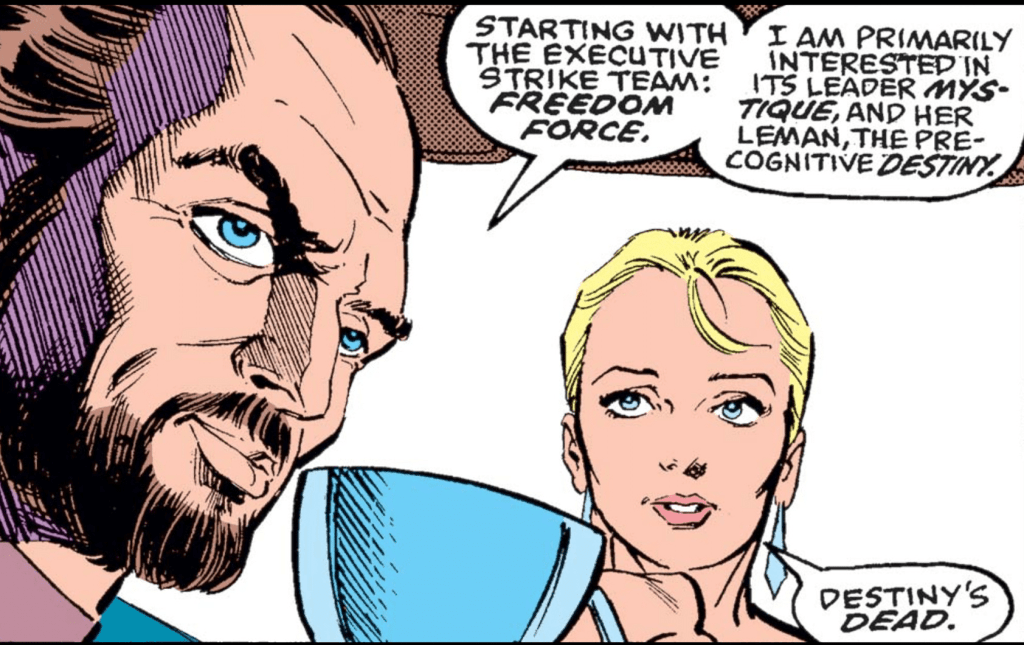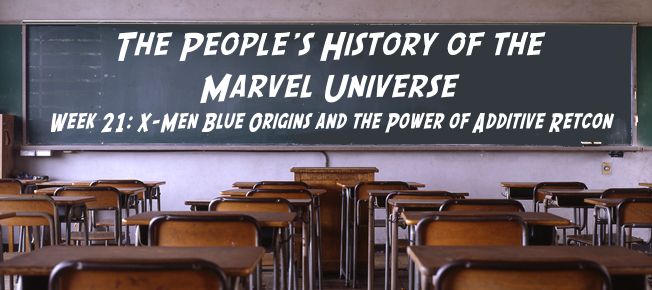People’s History of the Marvel Universe, Week 21: X-Men Blue Origins and the Power of the Additive Retcon
(WARNING: heavy spoilers for X-Men Blue Origins)
Introduction
If you’ve been a long-time X-Men reader, or you’re a listener of Jay & Miles or Cerebrocast or any number of other LGBT+ X-Men podcasts, you probably know the story about how Chris Claremont wrote Mystique and Destiny as a lesbian couple, but had to use obscure verbiage and subtextual coding to get past Jim Shooter’s blanket ban on LGBT+ characters in the Marvel Universe.


Likewise, you’re probably also familiar with the story that, when Chris Claremont came up with the idea that Raven Darkholme and Kurt Wagner were related (a plot point set up all the way back in Uncanny X-Men #142), he intended that Mystique was Nightcrawler’s father, having used her shapeshifting powers to take on a male body and impregnate (her one true love) Irene. This would have moved far beyond subtext – but it proved to be a bridge too far for Marvel editorial, and Claremont was never able to get it past S&P.

This lacuna in the backstories of Kurt and Raven – who was Kurt’s father? – would remain one of the enduring mysteries of the X-Men mythos…and if there’s one thing that comic writers like, it’s filling in these gaps with a retcon.
Enter the Draco
Before I get into the most infamous story in all of X-Men history, I want to talk about retcons a bit. As I’ve written before:
“As long as there have been comic books, there have been retcons. For all that they have acquired a bad reputation, retcons can be an incredibly useful tool in comics writing and shouldn’t be dismissed out of hand. Done right, retcons can add an enormous amount of depth and breadth to a character, making their worlds far richer than they were before. Instead, I would argue that retcons should be judged on the basis of whether they’re additive (bringing something new to the character by showing us a previously unknown aspect of their lives we never knew existed before) or subtractive (taking away something from the character that had previously been an important part of their identity), and how well those changes suit the character.”
For a good example of an additive retcon, I would point to Chris Claremont re-writing Magneto’s entire personality by revealing that he was a Jewish survivor of the Holocaust. As I have argued at some length, this transformed Magneto from a Doctor Doom knockoff into a complex and sympathetic character who could now work as a villain, anti-villain, anti-hero, or hero depending on the needs of the story.
For a good example of a subtractive retcon, I would point to…the Draco. If you’re not familiar with this story, the TLDR is that it was revealed that Kurt’s father was Azazel – an evil ancient mutant with the same powers and the same appearance (albeit color-shifted) as Kurt, who claims to be the devil and is part of a tribe of demonic-looking mutants who were banished to the Brimstone Dimension, and who fathered Nightcrawler as part of a plot to end this banishment.

I don’t want to belabor Chuck Austen, because I think that Connor Goldsmith is right about his run actually being a camp cult classic in retrospect. However, I think we both agree that the Draco was a misfire, because of how the retcon undermined Kurt’s entire thematic purpose as established in Giant-Size X-Men that Nightcrawler was actually a noble and arguably saintly man who suffered from unjust prejudice due to the random accident that his mutation made him appear to be a demon, and because of how the retcon undermined the centrality of Mystique and Destiny’s relationship.
X-Men Blue Origins
This brings us to the Krakoan era. In HOXPOX and X-Men and Inferno, Jonathan Hickman had made Mystique and Destiny a crucial part of the story in a way that they hadn’t been in decades: they were the great nemeses of Moira X, they were the force that threatened to burn Krakoa to the ground by revealing the devil’s bargain that Xavier had struck with SInister (and Moira), they were the lens through which the potential futures of Krakoa were explored, and they ultimately reshaped the Quiet Council and the Five in incredibly consequential ways.

This throughline was furthered after Hickman’s departure, with Kieron Gillen exploring the backstories of Mystique and Destiny in Immortal X-Men and Sins of Sinister, and both Gillen and Si Spurrier exploring their relationship with Nightcrawler in AXE Judgement Day, Sins of Sinister, Way of X, Legion of X, Nightcrawlers, and Sons of X. One of the threads that wove through the interconnected fabric of these books was an increasing closeness between Kurt and Irene that needed an explanation. Many long-time readers began to anticipate that a retcon about Kurt’s parentage was coming – and then we got X-Men Blue: Origins.
In this one issue, Si Spurrier had the difficult assignment of figuring out a way to “fix” the Draco and restore Claremont’s intended backstory in a way that was surgical and elegant, that served the character arcs of Kurt, Raven, and Irene, and that dealt with complicated issues of trans and nonbinary representation, lesbian representation, disability representation, and the protean nature of the mutant metaphor. Thanks to help from Charlie Jane Anders and Steve Foxe, I think Spurrier succeeded tremendously.
I don’t want to go through the issue beat-by-beat, because you should all read it, but the major retcon is that Mystique turns out to be a near-Omega level shapeshifter, who can rewrite themselves on a molecular level. Raven transformed into a male body and impregnated Irene, using bits of Azazel and many other men’s DNA as her “pigments.” In addition to being a deeply felt desire on both their parts to have a family together, this was part of Irene’s plan to save them both (and the entire world) from Azazel’s schemes, a plan that required them to abandon Kurt as a scapegoat-savior (a la Robert Graves’ King Jesus), and to have Xavier wipe both their memories.

Now, I’m not the right person to write about what this story means on a representational level; I’ll leave it to my LGBT+ colleagues on the Cerebrocast discord and elsewhere to discuss the personal resonances the story had for them.
What I will say, however, is that I thought this issue threaded the needle of all of these competing imperatives very deftly. It “fixed” the Draco without completely negating it, it really deepened and complicated the characters and relationships of both Raven and Irene (by showing that, in a lot of ways, Destiny is the more ruthless and manipulative of the two), and it honored Kurt’s core identity as a man of hope and compassion (even if it did put him in a rather thankless ingénue role for much of the book).
It is the very acme of an additive retcon; nothing was lost, everything was gained.
I still think the baby Nightcrawler is just a bad bit, but then again I don’t really vibe with Spurrier’s comedic stylings.



